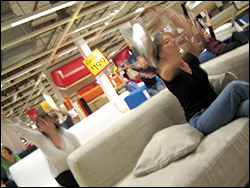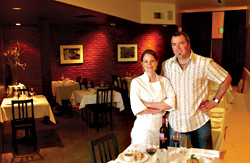The first thing I heard was the music. The sound of an acoustic guitar trickled from a boom box as a dozen dancers gave a neatly choreographed performance, using varicolored sofas as tumbling mats. Their synchronized leaps and wild arm movements drew a crowd. Every so often, a cell phone would go off or a baby would scream at the top of its little lungs. I’d normally have a reason to be irritated, but it’s hard to expect total silence when the arts venue you’re at is a furniture store.
The creator of The IKEA Cycle, local playwright Keri Healey, is no stranger to edgy artistic choices. Her play Parrot Fever, produced at Capitol Hill’s Union Garage in 2003, tackled a largely taboo topic: sex chat rooms. Yet despite her risqué subject, there was little risk in staging a transgressive play in a neighborhood teeming with them. In that sense, Healey’s latest project, presented by Printer’s Devil Theater, is much bolder: It’s a cycle of 13 scenes written with a particular venue—Renton’s IKEA—in mind.
“It actually came about because of 4Culture,” Healey says of the work. Last spring, the organization formerly known as the King County Arts Commission decided to lend its support to site-specific works, something it hadn’t done before. One of its directors, Charlie Rathbun, asked Healey whether she knew of anyone who could write such a work for a suburban venue. After talking with Rathbun, she decided to give it a try herself. “I told him that for years, as somebody who visited IKEA as a shopper, every time I go in there, it just looks like the rooms want to tell little stories,” she says. According to Rathbun, this was just the sort of idea 4Culture had in mind. “I literally grabbed her, and I just said: ‘Keri, you’ve got to go for it! That is perfect!'” he recalls.
Next Healey sought the store’s approval. What she and IKEA settled on was a set of scenes—10 minutes or less apiece, performed in sets of three or four per night—that “wouldn’t really stop the flow of traffic in the store,” which attracts around 50,000 customers a week. Charged with staging kitchen-sink drama in a place where the kitchen sink is for sale, Healey worked with fellow Seattle playwright Bret Fetzer to develop engaging characters. They decided to link the scenes by setting them all in the same (unnamed) neighborhood, then brainstormed various interpersonal relationships. “There is a huge linear story that’s there, but we’re only seeing pieces on the timeline, throughout probably a three-week period,” Healey explains.
Does it actually work? The three scenes I saw—a melancholy anniversary dinner; a conversation, by turns nostalgic and snippy, between a divorced couple; and the aforementioned dance number—were certainly diverting. I doubt I’d schlepp to Renton again to see how the story turns out, but Healey is more interested in reaching the untold masses who stumble across the work by accident. “I was a suburban kid with no access to urban arts, and when I started discovering theater in little, tiny, offbeat venues, it was eye-opening to me,” she says. “You don’t have to do that to a million people, but if you get a couple of ’em, either they’ll make the trek to Seattle to see more stuff or they’ll start things in their own community.”
When I mentioned this point to Rathbun, he agreed, adding: “I also think [site- specific art] is a catalyst in terms of how art is viewed and produced in our community. So that it’s not always funneled through an existing facility or management structure or institution.” The IKEA Cycle is one of 15 site-specific projects 4Culture has planned through November, so when you see some guy conducting a woodwind quartet in the fireplace nook of your neighborhood Tully’s, don’t panic—just applaud.
The IKEA Cycle runs through Nov. 9 at IKEA, 600 S.W. 43rd St., Renton, 425-656-2980, www.ikea.com. Performances happen every Monday and Wednesday between 7 and 9 p.m. For a full scene schedule, visit www.4culture.org.








